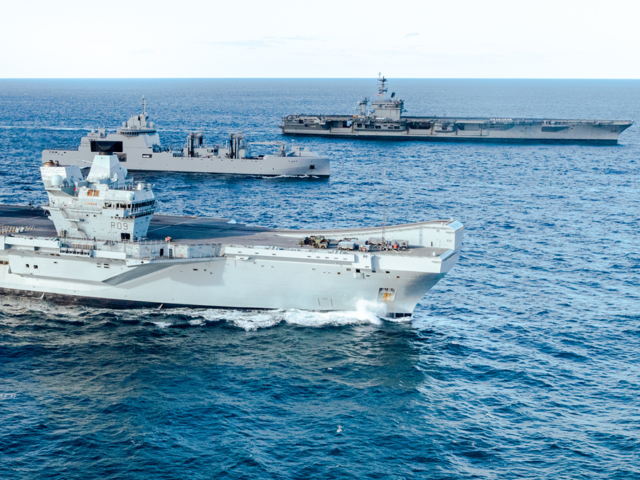The American supercarrier USS Dwight D. Eisenhower will need to return to the U.S. soon and the Royal Navy is ready to replace her with a British carrier on station in the Red Sea if necessary, the Armed Forces minister says.
James Heappey MP answers weeks of criticism over why the United Kingdom has two aircraft carriers but none have been deployed to the Red Sea conflict hotspot, saying there is already enough Western military equipment in the area, but British ships would go if needed. A group of allied warships including a British destroyer and frigate, and a U.S. battlegroup including the supercarrier USS Dwight D. Eisenhower (‘Ike’) have been deployed to the Red Sea since last year, defending global merchant shipping from missile, drone, and pirate attacks by Iran-backed Shiite Muslim Houthi militias.
The Red Sea is one of a handful of strategic global waterways which provide an important time-saving passage to the flow of trade, but which are also narrow enough for state action or terrorism to potentially close them off to commercial ships. In this case, hundreds of ships have been diverted away from the Red Sea to around the Horn of Africa, adding nearly two weeks to the voyage and piling considerable costs onto the industry.
Ultimately, the downstream effects to the wider world is the threat this is yet another inflationary pressure on the economy, while shortages and delays can shutter starved factories or lead to empty store shelves. Nevertheless, the UK’s position is one that the situation is being managed for now.
“There’s no real need for more carrier mass – for more carriers to be in the region than the Ike can provide. She’s a very capable ship” said UK Armed Forces minister Heappey, speaking to Parliament’s House magazine in an unpublished interview cited by Politics Home. Between the ships presently in the Red Sea and the British contribution of jets bombing Houthi positions from the British sovereign base in the Eastern Mediterranean, the pro-trade allies are “able to meet the challenge as it is now”, he said.
But if the Houthi effort to attack trade transiting the Red Sea intensify and more military support is needed, or when ships inevitably rotate out of the region for resupply and crew leave, British aircraft carriers will be able to fill the gap. Heappey said: “when the Eisenhower goes home, if we were needed to plug a gap in US deployments, or if the situation deteriorates and we need more”, then Britain could send a carrier.
He continued: “The fact is the Eisenhower can’t stay there forever. And so there’s a thing about just maintaining a carrier presence in the region where we might cooperate with the Americans to provide a capability there.”
The United Kingdom has two new ‘supercarrier‘ aircraft carriers, the HMS Queen Elizabeth and HMS Prince of Wales, which have been launched and worked up to a state of readiness over the past ten years and that replaced three light aircraft carriers of the previous generation. While both ships have experienced teething issues and no full airwing has yet been worked up, the government says it can deploy a carrier strike group.
Indeed, a major contribution of the UK to this year’s major NATO wargames, Exercise Steadfast Defender 24, will be one of the country’s supercarriers escorted by destroyers and frigates, and carrying an air group of F-35 jets and helicopters. One gaping hole in the deployment, however, is a stores ship: Britains’ final remaining solid stores ship, RFA Fort Victoria is in refit and will not be deploying this year. A new class of three solid support ships — which provide food, ammunition, and fuel to warships to sustain them at sea for extended periods — are not due to be active for years.
A key platform of the NATO alliance is interoperability — the armed forces of each member nation being compatible with the others — meaning when the British carrier and her attendant warships go to sea for the exercise, or should they deploy to the Red Sea, they can be resupplied by supply ships from other allies. Yet the lack of availability seriously undermines Britain’s ability to operate independently and its claim to possess a ‘Blue Water’ navy, never mind the two expensive aircraft carriers it has commissioned, yet failed to provide the logistical underpinning for.

COMMENTS
Please let us know if you're having issues with commenting.